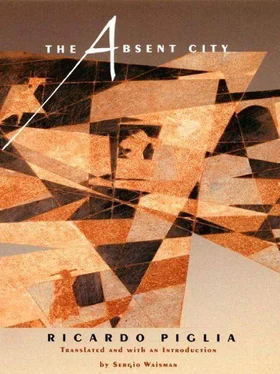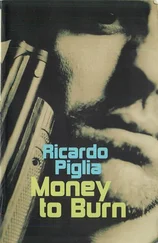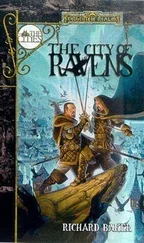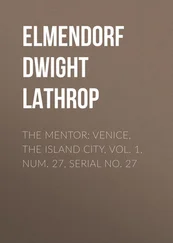She looked like a girl, she must have been thirty years old but it seemed as if she had never aged.
“You sing well,” he said, and stood up. “You should take care of yourself.”
“What?” she asked. “Are you leaving already?”
“I’m leaving.”
“Aren’t you going to bring me the gin?”
“Yes.”
The woman shook her head as if to wake up and tried to smile.
“Gin, and if you can, some bread.”
“Okay,” he said.
“Bread, some salami, anything.”
“Okay, gin and something to eat,” Junior said. He walked to the door followed by the woman, limping behind him.
“I’ll be right back.”
He opened the door and went out to the hallway. It was still empty, illuminated by a pair of bare bulbs hanging from the ceiling.
“Listen,” she said.
Junior turned around. The woman was standing behind him, grabbing the door and holding her shirt closed across her chest with one hand to cover herself from the cold.
“Bring whatever you can find, a little can of pâté, whatever they have.”
“Okay,” he said. “Yes.”
Outside, night had fallen. Junior hailed a taxi and asked the driver to take him to the Museum. It was more than an hour away. The ride was smooth. It was growing dark and the whole city was illuminated. He put on his headphones. Crime and the City Solution was playing. Somewhere from the rooftops searchlights swept across the sky with blue beams. He had the recording that Renzi had given him. It was the machine’s latest known narration. A testimony, the voice of a witness recounting what he had seen. The events occurred in the present, on the edge of the world, the signs of horror marked on the earth. The story circulated in the form of copies and reproductions from hand to hand. It was available in the bookstores on Av. Corrientes and in the bars of the Bajo, the neighborhood near the port. Junior put in the cassette tape and let himself be carried away by the inflections of the person who began to narrate. Beside him, the city dissolved in the fog of autumn while the taxi turned down Av. Leandro Alem, heading south.
The first Argentine anarchist was a gaucho from Entre Ríos. He met Enrico Malatesta once in some fields near the town of Bragado when a great flood brought them together. They spent three days sheltered on the roof of a church, covered by the Italian man’s raincoat, watching the water rise and the floating branches and dead animals brought in by the Paraguay River. Curled up beneath the spread-out coat, they ate wet crackers and drank gin until the rain subsided. During those days, speaking in a kind of pidgin Spanish mixed with Italian, aided by small drawings and signs, Malatesta convinced the gaucho of the truths of anarchism. Aha, the peasant would say, aha. And he’d agree by nodding his head. That gaucho was Juan Arias. He traveled around to the large cattle ranches preaching the Idea he had learned from Malatesta until he was killed by a group of murderers from the Nationalist Autonomist Party. They pressed him up against the atrium of a church on an election day, on a Sunday, and stabbed him to death because he claimed that the oral vote was unfair to the poor and humble in the countryside. Out in the province they called him The Other Fíerro because when he didn’t know how to convince people and he ran out of words he’d start reciting Hernández’s poem. The gauchos speak in verse and the workers stutter. The Stutterer, everyone knows him, thin, jumpy eyes, evasive gaze. In the world of labor, in the factories, people don’t speak like this, suddenly, all at once. The worker’s words, the worker’s words sound like babble, a stuttering that struggles to express itself. This can be seen clearly on television when people from the work-world are asked to say something in an interview, for example. You have to give them at least five or six minutes more than others, because their words are broken up with silences, except in the case of the union representatives who speak like radio announcers and can come up with phrases right on the spot. It’s a manner of speech that I know very well. Say your line, say your line, tell your story, and the man has difficulties telling his story and saying his line, it’s a tragedy. Even my mother, before she died, told me of a peasant who was executed in a plaza, tied to a pole. She was never able to forget that man, a short foreigner, because the town’s loudspeakers kept playing music and advertisements while they shot him, as if nothing was happening. I’ve seen things that make me want to start life over again, without any memories. I’ve been on the verge of leaving my wife and children, of taking a train, of going to Lomas, to my sister’s house in Bernal, to Chivilcoy, to Bolívar. But it’s no use, if you leave, your memories still go with you. They killed them like sparrows, running, hooded, what can a person do, their hands tied, they would shoot them from only two meters away and throw them in the pits, then they would come with bulldozers and cover the graves, sometimes they even made the wretches shovel the ditch themselves before killing them. You would see them as if in a dream, the naked Christians digging the hole. Around those times I found myself working with a gentleman named Maradey, Maneco Maradey. The field is located on the other side of the forest, I always called it “Las Lomitas,” a field of two, three thousand hectares, that stretched as far as La Calera, El Diquecito, La Mezquita. I took care of the animals, we planted a few things, I’d get a certain percentage from the animals when they were sold instead of a fixed salary. I worked there with that gentleman the entire month of April, and there were some abnormalities in those fields, at the very, very back of it all, armed men, beyond the gate, some barracks, a large shed rather, located on the double highway to Carlos Paz, the highway wasn’t open then, there was a road called El Camino Viejo a La Calera that was intersected by a paved road, south of Malagüeño, no, north of Malagüeño, I’m sorry, I had a dairy farm some five hundred meters from that shack, my wife and I were cleaning the jars when the incident with the calf took place. It turns out that in the cornfield, right out there, there was a pit, and my calf fell into it, you see, a pit, exactly eighteen meters long. I’ll explain to you why it was exactly eighteen meters long, because the calf falls into the pit, it was arched like this, from higher to lower, you couldn’t see anything from outside, the calf was bleating inside and outside a cow was scraping at the ground, like this, with its hoof, it was mooing, calling the calf. And so I go and ask this friend, Maradey, who was just about to leave in his truck, to lend me some boards because one of my calves has fallen into a pit, into a pit from a mill I thought at first, no? Then I go with two workers to bring some large horses, some percherons, and I go to Malagüeño and ask for exactly forty meters of rope, and they give me just about forty meters of rope. Okay, so we put the boards like this until we start shining some light down with some mirrors to try to find the calf, and we see, how can I tell you? This man, Maradey, he didn’t care, nothing bothered him, that image, no one can imagine it, what was in that pit, those corpses, and the man and I put together a harness with that rope, and then, lighting my way with the mirrors, I bend the rope in half and grabbed it in the middle, I make a lasso on one end and I send it down. The small calf was standing, it was a black calf, kind of thin, tall, its legs sticking straight down, and as I was lowering the rope — looking through the mirror — there were all sorts of terrible things in there, bodies piled up, remains, even a woman all rolled up, sitting like this, her arms across her legs, hunched over, you could tell she was young, that woman, her head sunk into her chest, her hair hanging down, barefoot, her pants rolled up, and above her there seemed to be another person, I thought it was also a woman, fallen with her hair forward, her arms twisted backward like this, it seemed, I don’t know, it was like a dug-up graveyard, the effect of what was in there, in the mirror, the light it gave off, like a circle, I would move it and see the pit, in that mirror, the shimmering remains, the light would reflect inside and I saw the bodies, I saw the earth, the corpses. Then, in the mirror, I saw the light and the woman sitting and in the middle, the calf, there it was, its four legs stuck in the mud, stiff with fear, and when we started pulling it out we noticed that it had broken its right leg up almost near its back, above the shoulder blade, and we pulled it out, poor little guy, its eyes looked almost human. I remember that I hosed it off and that I was getting my face wet with the water so that Maradey wouldn’t notice that I was crying, and I could barely breathe and I ask him what are we going to do, and he says, nothing, leave everything and not say anything. And I never went back, I don’t think, I sort of left my house to live with Old-Man Monti because I didn’t want my daughters to do any of those things that young people do, I didn’t want them to dance, nor have a good time, I couldn’t listen to the radio, so since I was so bothersome to everyone I left, I made myself a bed at the cattle station, at the edge of the field, and I was more comfortable there, with Don Monti, I could think, he had seen everything, he had been jailed by the conservatives before. There has never been anything like this, he tells me. He once saw a man killed by the police in Puente Barracas just to teach people a lesson, they put him up against a back wall, a large man, they held him by his hair like this and killed him, you see, Don Monti says. But this, he said. This is like Dante’s Inferno, he says. I remember that Old-man Monti was having a smoke when I told him, he was a man who could handle anything, he had worked in the capital and then moved to the interior when his wife and kids died in a fire. He was the first one to tell me what was going on with the frost. Because we were just above it, on this side of the fence, the small dairy, on this side of the large prairie, the only area with grass, because El Torito Hill, what is known as El Torito Hill, is all natural fields with rocks and prairies full of grazing pastures, the ruminants really seek it out, and that area isn’t cultivated, nothing was done there in those days. I could see the whole field from up there, the entire prairie, the only one with green grass and soft earth that could be cultivated, you see, and below, the pits, I never put a cross out there, nothing. Sometimes you’d see the carrion hawks flying over, they couldn’t cover everything up. They were digging and digging, as the winter approached you’d see more. They did everything at night and in the morning, with the frost, the squares, the white horror. On some pits you could tell they had thrown in slaked lime, the lime always rose to the surface, the grass doesn’t grow quickly enough and then with the frost, the field gets frost burn when it freezes, it gets frost burn. I mean, you can see the whole wide plains with those white rectangles, one almost right next to the other, sometimes they left five or six meters in between, you could see rocks that they couldn’t dig out, sometimes they would start a pit and sixty centimeters down they’d hit a large stone, so they’d dig right next to it, sometimes they’d make the pits a little thinner, sometimes a little larger, the pits were two by three meters in size, or something like that, and the earth, when they covered them up there was a lot of earth left over, the pits never ended up even, some were parallel to each other, but they were almost everywhere, the pits, because sometimes they would come to dig them on one side, then on another, and there was always so much earth left over, always so much left over, they would dig at night, even when it rained, they didn’t know what to do with the remains. It was an unmeasurable map of crowded pits in that large prairie, that’s what I say. I couldn’t tell you how many, but I figure easily over seven hundred, seven hundred and fifty, I figure, because that area had possibly sixteen hectares, fifteen or sixteen, it’s hard to tell, and it was almost completely covered, a cemetery without crosses, nothing, completely wild. There were even some pits that would go unused for six or seven days. During the day, I climbed down into several of these pits, before anyone had been buried in them, during the day all you can see is the field and the pits, the field and the pits, I even rescued some small dogs once, and a few hares that used to fall in, too. Those pits came up above my head, maybe they were more than two meters deep, and sometimes, by the following evening, they were no longer there, sometimes you could hear everything through the window, you’d see lights, movement, lanterns, armed men. And sitting with Monti on the small low chairs in the patio facing the plains, thinking I have to get out of here, but how could I have left, where to, in those times? I thought I’d go to the Chaco area where I had a buddy, but it would be worse wherever I went, I wouldn’t have been able to say anything, at least there I was with Don Monti, we’re the last ones, I thought, we took care of the dairy farm, of the animals, we waited for the winter to pass sitting at the door of the ranch, Don Monti would raise his hand, like this, I remember, and he’d say they come from there and from there, they would back the truck in and kill what they had brought, everything that they brought, the people with their hands tied, in hoods, right there, what could they do? Without even turning the car radio off, a car without a license plate, with music and commercials, huh, Don Monti, sitting at the door of the ranch, at the cattle station. That’s how it is, the old man would say to me, worse than animals, the worst of the worst. Then he’d stop talking, take a drag from his cigarette, raise his hand, show me the prairies, below.
Читать дальше












